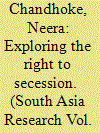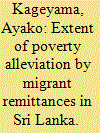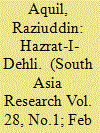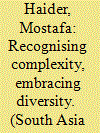|
|
|
Sort Order |
|
|
|
Items / Page
|
|
|
|
|
|
|
| Srl | Item |
| 1 |
ID:
080816


|
|
|
|
|
| Publication |
2008.
|
| Summary/Abstract |
One of the most intractable problems confronting South Asian states and societies has been the presence of secessionist movements and insistent demands for a state of one's own. Though societies and states tend to react violently when faced with such demands, many serious issues are embedded in secessionist demands, as well as in the responses to these demands, above all issues of justice and injustice. The present article seeks to trace out the key issues involved in demands for secession, exploring reasons for why and when such demands arise in the first place. Examined within the wider context of international law, specific scenarios in South Asia are considered to propel a debate about whether secession can be argued to be a right, and in what circumstances. It is proposed that the concept of secession has, in effect, to be extricated from narrow agendas of national security, war against terror, and military strategy, and placed within the wider domain of normative political theory, which can indeed find justifications for demanding secession.
|
|
|
|
|
|
|
|
|
|
|
|
|
|
|
|
| 2 |
ID:
080819


|
|
|
|
|
| Publication |
2008.
|
| Summary/Abstract |
After reviewing some of the available empirical literature on current trends of remittances and their economic impact on welfare of migrating countries, this study focuses on the case of Sri Lanka to demonstrate that workers' remittances may have both positive and negative consequences in home communities. Economically, remittances will benefit migrant households, particularly poorer ones, by increased income in the short term. However, they may sometimes cause negative social effects, particularly through disruption in family relations and also by creating a sense of relative deprivation in non-migrant communities. Therefore, migration and remittances are not the sole solution of poverty alleviation and appropriate policies also need to address unexpected adverse effects
|
|
|
|
|
|
|
|
|
|
|
|
|
|
|
|
| 3 |
ID:
080817


|
|
|
|
|
| Publication |
2008.
|
| Summary/Abstract |
This article explores the significant linkages between the rise of Delhi as the foremost Sufi centre and the bastion of Islam as well as the seat of political power in the 13th and 14th centuries. Three out of the first five leading Chishti saints of the Sultanate period chose to live in Delhi, catapulting the city onto the map of the sacred geography of South Asian Islam. The Chishti Sufis also helped in shaping the cosmopolitan character of the city, even as they ensured that the interests of Islam and Muslims were safeguarded. Hence, though Delhi remained the centre of Muslim power for close to six centuries and its landscape is dotted with mosques, madrasas and dargahs of the Sufis, the exclusionist, juridical interpretation of Islam was sidelined in favour of a more inclusive approach to religion practised and propagated by the Chishtis. The essay charts this process and its significance for the early history of Islam in India
|
|
|
|
|
|
|
|
|
|
|
|
|
|
|
|
| 4 |
ID:
080818


|
|
|
|
|
| Publication |
2008.
|
| Summary/Abstract |
The diversity of children's work and life across the world has generated intense debates on the socio-legal status of working children, particularly in countries of the South. Official legal systems often accord little recognition to working children, while in practice they encompass a distinct yet complex entity. This article examines the tensions between official international and national laws and the actual reality or 'living laws' regarding working children in Bangladesh in a wider interdisciplinary context. While these children are mainly so impoverished that they have to work for their own survival, to deny them any agency in negotiating their position seems misguided. Thus it is argued that the present dominant understanding of child work is not compatible with the real life situations of such children and is, in fact, injurious to their individual interests. The article suggests that a culture-specific analysis which properly diagnoses the contextual struggles of working children in countries like Bangladesh is better suited to minimising the ongoing suffering of working children
|
|
|
|
|
|
|
|
|
|
|
|
|
|
|
|
|
|
|
|
|